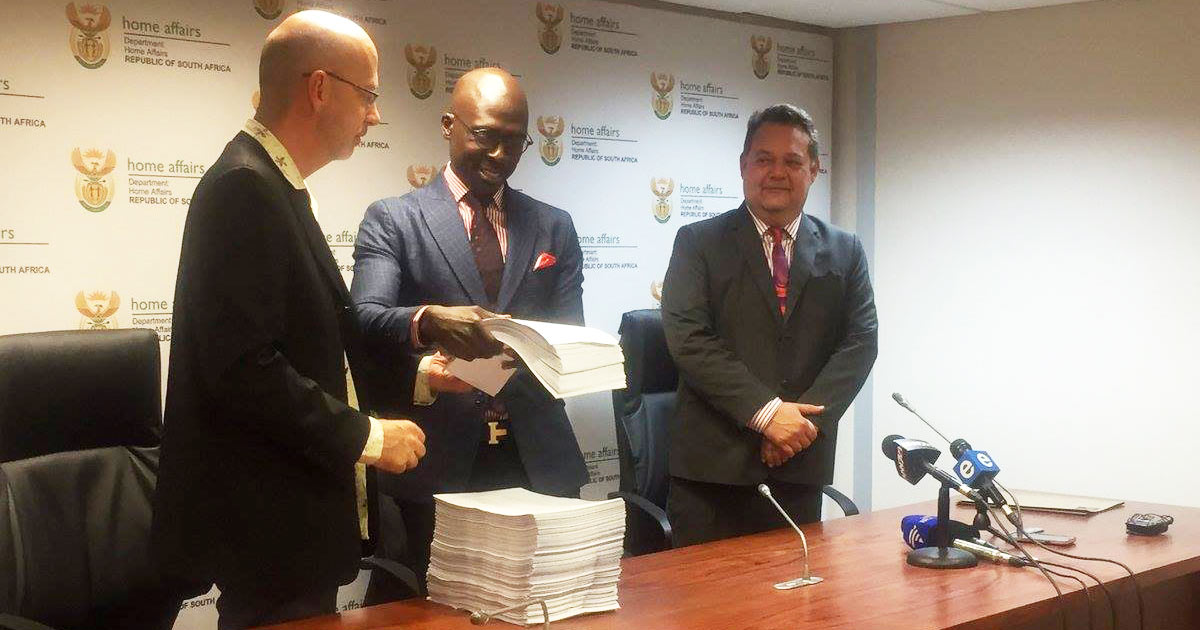South African LGBTQI+ rights are still something to fight for

Coenraad Kukkuk (far right) presenting 60,000 signatures demanding the banning of hate preacher Steven Anderson to the then Minister of Home Affairs, Malusi Gigaba (centre), flanked by Hendrik Baird in 2016.
We know how brilliant our country’s Constitution is, and how well it protects the rights of LGBTQI+ people. There is no constitution like it on the continent of Africa. However, how many of us know exactly what our rights are?
Coenraad Kukkuk is an attorney with extensive knowledge of LGBTQI+ rights in South Africa. He points out that while the LGBTQI+ community does not have a separate section devoted to it in the Constitution, our rights are protected under the umbrella of the Constitution, particularly in Section 9.
A conversation with Kukkuk is a sobering experience and brings the gravity of SA law and human rights into tight focus as it applies not just to South Africa, but to the African continent.
“South African judges work in an acting capacity in several SADC (Southern African Development Community) countries,” he reveals. “Often when it comes to human rights, they quote the South African legal system. There has been a lot of interaction internationally with the South African legal fraternity.”
Laws and rights must be more than just words
Section 9 of the Constitution states: “No person may unfairly discriminate, directly or indirectly, against an employee, in any employment policy or practice, on one or more grounds, including race, gender, sex, pregnancy, marital status, family responsibility, ethnic or social origin, colour, sexual orientation, age, disability, religion, HIV status, conscience, belief, political opinion, culture, language, birth or on any other arbitrary ground.”
It’s under this that LGBTQI+ rights are enshrined in the country. Kukkuk also notes that the constitutional right to free speech and expression is not absolute. “Freedom of speech is limited,” he says, “Freedom of speech does not include hate speech.”
However, Kukkuk also points out that laws and constitutional rights are no more than dead words on paper if they are not enforced or enacted. South Africa has a fair track record of doing this, at least in some cases.
A landmark victory against hate
Controversial US pastor, Steven Anderson, for example was prevented from entering the country in 2016 by the minister of home affairs because his bigoted comments about homosexuality amounted to hate speech.
The process of getting Anderson banned is a testament to what the queer community can achieve by working together under the law.
“We gathered over sixty thousand signatures,” Kukkuk says, “And the minister also barred Pastor Anderson because of the complaints laid against him at the Human Rights Commission (HRC).”
This earned Anderson the unenviable accolade of receiving the highest number of complaints against a single person ever submitted to the HRC. “This,” continues Kukkuk, “is an example of what we can do together as a united community.”
There is still much to be done
Kukkuk believes that the South African LGBTQI+ community should be proud of how far we have come since 1994.
“We must recognise and take account of what we have achieved through the past few decades,” he says, “and what we do as a community doesn’t just help South African people.”
Kukkuk, nevertheless, acknowledges that much must still be done in securing equality for all.
“People ask, ‘why do you still march?’ While queer people in the country and the continent continue to be killed and discriminated against, we will still march. So, there is still a lot of work to do.”
Leave a Reply